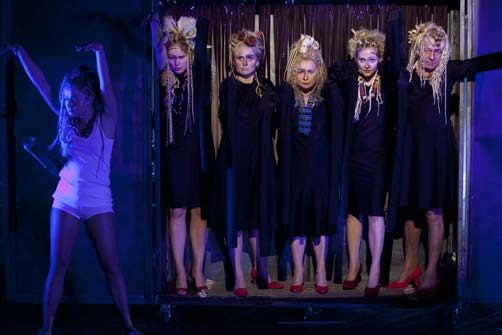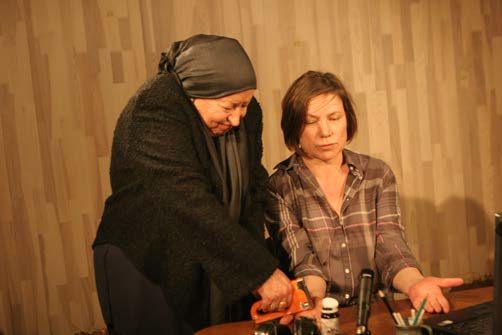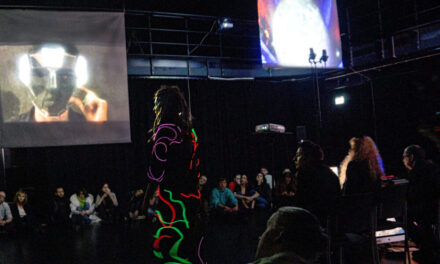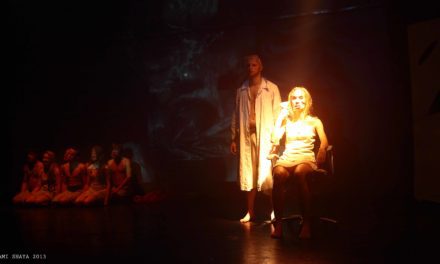Reminiscing on A Piece On Mother And The Fatherland, you said, “I phoned my friend to say: ‘Listen, I have written a sentence addressed to my mother and I am scared.’” What sentence was that?
“Fuck you, you hyena!” I was scared by my need to overstep boundaries relating to one’s mother that should not be overstepped, whether she is liked or not. It horrified me that, despite this, I could so nonchalantly raise and level a sacred hierarchy.
Was this meant from the beginning to be a story of your Mother?
I am not denying that my mother was the template here, and some passages are a close record of her speech. Later, however, I attempted to universalize the text and move from my mother to the Mother and then to the Parent, and an even more general level. But if you are asking about the creative process, it began with the daughter, a laced up expression and emotions. I sensed that my mother awarded herself the right to attention, for she had the right to a history, narrative, misfortune, and tragedy. But I have no history or narrative, and my emotions are completely subordinate to hers. In short, this is a slavish relationship in which, at one point, the daughter has to become aware of the need to stand up for her own identity. My actual mother or the Mother from A Piece… bars access to history for various reasons, including the fact that she wants to defend the Daughter from the cruelty of the past.
But at the same time, she bombards her with traumatic tales, installing them as a point of reference for reality. The historical narrative is fused with the figure of the Mother.
The point here is that attention is supposed to be focused on her. Unfortunately, there are no courses on how to be a parent. If history has ridden roughshod over a parent, forcing him or her to crawl through life, it is difficult for a child to become isolated from this. Of course, the historical narrative of the real mother is based on fact and relates to real events, so it should be spoken using her language, phrases, and emotions. For me, the problem was to liberate myself from this language while maintaining the drama of her experiences. What language could I use, since these are not my memories? I was looking for a form that would allow me to break away from the language of the Mother.
After all, the Mother’s language naturally flows from her experience.
Which mother are you asking about – my actual mother or the one in the text? In the case of the Mother, the exalted language speaks for itself, but I, as the author, was unable to endure it, as it was making me vomit. But since I felt that I had to tell this story, I had to invest it with a sense of irony, reserve, and universality. When the Narrator speaks of the Mother’s wartime experiences, she uses the language of pop culture. I used a language of this kind so that I could slot it into the story while avoiding the culture of victimhood. I turned to The Lord of the Rings and had images in mind of the swelling army of evil from the book and the film adaptation.
The Mother tries to place the Daughter in the position of a victim. Is empathy only possible in a community of victims?
The Mother completely fails to comprehend any other aspect of closeness. For her, only another victim can be someone close. A victim is experienced, knows what is most important, the victim is sacred.
You pose the radical thesis that a lack of historical narrative denotes lack of identity. How does the Daughter fit into this relationship?
This is not my thesis. Everyone has their own histories and their own historical narrative. History goes on. It didn’t stop in 1945, or in 1989, as Fukuyama claimed. The Daughter’s identity is probably more sharply outlined than the mother’s, as it was formed in a battle for identity waged against the closest person, at least in formal terms, to her. If this was not the case, she would not know how to label the situation in which she found herself and, as a result, dissociate herself from it. The problem resides in the fact that the Mother perceives the Daughter as an extension of herself, a biographical vermiform appendix. She thinks that her daughter is a natural continuation of herself. The Daughter is unable to either cultivate or affirm her own autonomy in her Mother’s presence, and at the same time needs to stick by her, for it seems that her presence is a necessary condition for her Mother’s survival. To the Daughter, it appears that if she refuses to hear her mother out, she is performing an act much like cutting off the Mother’s oxygen supply. It appears that if she leaves her, then the Mother will die, choking on her own memories.
The Daughter has her own story and identity, but this is not the matter at hand. The question is: What is the value of a culture in which History, with a capital “H,” is made up of aggression, suffering, and bloodletting? And “history” is of little account? Does that mean that anything that is private, reflexive, critical or individual is completely insignificant? This is sick. This is historical policy. For historical policy also relies on the fact that the meaning of some events is created by depriving others of their meaning.
In A Piece… you contrast the tragic personal story of an individual with a somewhat simplified vision of an intolerant, nationalistic Poland.
A nationalistic Poland (and such a Poland actually exists, and on what a scale!) is in itself a reification of all manner of human content. I live in Warsaw and I observe the annual commemoration of the anniversary of the Warsaw Uprising with increasing bitterness. Scores of young people of both sexes, dressed up in the uniforms of insurgents, celebrate this festival of death. They are envisioning or enacting something, but do they know exactly what? For they can only envision their own deaths, as this is what the experience of the Warsaw insurgent amounts to. What are they celebrating? It’s turning into a kind of Totenfest. In 2010, I saw parents who had dressed a three-year-old child in a German uniform with a big helmet and given him plastic grenades. In the Old Town, by a church. But what kind of message does this send? By the Monument to the Little Insurgent, which I personally regard as a disgrace, for it serves as an affirmation of lack of accountability for the life of a child who should be protected and not exposed to danger, the parents got their child to pose for photos. This is simply thoughtlessness, a lack of historical reflection. Does this mean that the Polish identity accrues to you when you change into an insurgent’s uniform and wave a red and white flag? Are you only a Pole if you become part of the bloodletting community? Is there no other way of gaining access?
While writing A Piece…, I became hardened in my conviction that art does not come from justice. At least in the sense of weighing arguments and diplomatic forms of expression. A play is meant to clearly, and indiscreetly, show that, rather than being a space for statistical surveys, it is instead a place for establishing identities and finding a way to label my problem. Feelings are often unjust, in the sense that in order to ultimately feel and articulate something important, one must stop worrying whether or not it is going to hurt anybody. Art can introduce themes that were previously invisible, that were often opaque, with the force of a poster. From the outset, I knew that I would have to ruthlessly drive my point home, in order to demonstrate that enslavement at the family level is a norm inscribed into culture and that a relation exists between what is in the family and what is in the public sphere. The Daughter’s problem is that she lacks the courage to stand up for herself, so is losing her autonomy and is faced with the need to personally redefine how to recover what she has lost in her relations with the Mother.
Emancipation for the Daughter is death for the Mother?
Not at all! Liberation is the consciousness of the human rationales which are there to support her. After all, she understands the Mother, but she can no longer remain in this relationship based on maternal rights. She may demand accountability from the Mother as she would from an adult. The Daughter has to state, “I am a person, like you, and my experiences are just as important as yours.” The death of the Mother is not necessary at all. What is needed for the Daughter is to withdraw from her internal bondage and reject her residual convictions. My book takes the side of individuality and not hierarchy, which in this case is engendered in the sacred role of the Mother, and it is so difficult to defy this, to direct the Mother toward the human dimensions of the particular person.

Polski Theater in Wrocław, A Piece On Mother And The Fatherland; Photo: Natalia Kabanow
No doubt it is more difficult to block the memories which the Mother is attempting to pass on.
Do you know how easy it is to splatter a child against a wall with a story about how I SUFFERED? A story about an illness or about the fact that the mother got pregnant, so couldn’t have a career as a singer, or that her husband was mean, and besides, everything’s getting expensive. A martyr’s narrative smoothes the way to enslavement and the narrative is less important than the actual slavery itself. It makes no difference what the cudgel of choice is, although, in my book, this cudgel has steel studs and is blood-stained, because the story of the Holocaust is no lark and both of them know this. I confess that I was uncertain whether the Holocaust can be spoken of in this manner. I knew that I wanted to give an account of it, but I didn’t know what form or language to use.
You decided on an atypical form.
I call this text “poetically organized,” meaning that its import is expressed in sentences and words. At the beginning is the sentence: “this was the Jewish demise that was less than human / attested to by facts, archives, and documents.” This, for me, is a sentence written in a serious tone. It is a very serious sentence and there is none of the Daughter’s irony in it yet. The irony and fun begin three verses later and the emotional atmosphere between the Mother and Daughter continuously changes, almost from verse to verse. In Jan Klata’s production, this sentence is uttered with detachment, as if the narrator is already mocking the Mother from the outset. While writing, I was afraid that I would give cause for sentences of this type to be treated with a lack of gravity. In fact, that interpretation was troublesome for me.
Klata evokes the musicality in your text.
I really liked this idea, because, although I was not writing it with theater in mind, my book does have a whiff of the operatic. The production begins with texts that are sung in rhythmical repetition, sung extremely beautifully in fact. Klata set the text to music in an interesting way. I liked it very much.
How did you take the idea to feature five women and a “feminized” male character?
I adore this male character who is feminine, as there is that cultural truth that no one is “born” a woman or man; culture molds us according to this rather than any other model. I think that this is a deeply feminist production. The man/actor shows something that can be found, for instance, in Almódovar’s films: gender is culturally constructed and imposed in the form of convention, systems of behavior, and so on. A man can “be a woman,” assuming that he has the opportunity to choose between these conventions. For example: He can sit at home and let his wife do the earning, as long as this is a joint decision. As far as the division into several characters is concerned, this is a gesture that reverses what I did. I began with an individual story and went on to add successive layers universalizing the story. However, Klata began at the cultural level – it is not one story that is of concern here, but rather the general parent-child relationship and how this functions in culture.
In addition, the actresses swap the roles of Daughter and Mother, also exchanging their lines.
This is quite an innovative idea. It shows the recursive nature of the Mother-Daughter role in culture, a role which actually needs to be acted out. Today the Daughter is rebelling, but tomorrow she’ll be stepping in the shoes of her Mother, she’ll have her own Daughter, and so on. I wasn’t really writing about this, but I agree with this interpretation.
Klata also reduced the social context to a single collective monologue and a dance with a flag. I would imagine that this was quite significant for you.
I think that Klata is most interested in how the martyr paradigm is part of Polish culture and how destructive it is. Indeed, in the production, there is no sign whatsoever of the Holocaust motif, which is immensely important to me, or the Polish-Jewish theme. The epilogue to A Piece… – a portrayal of anti-Semitic, homophobic, nationalistic Poland – was excised. Klata didn’t take this on and I regret that. The most glaring omission for me, however, was a perspective which would enable the character of the Mother to be presented in a manner that was more than simply grotesque. But this can’t be achieved without at least some psychology, but there is no psychology in Klata’s interpretation. And the Mother is the oppressor by the simple virtue of playing the Mother role, and for no other reason. Maybe Klata assumed that the historical context is obvious? For me, differences in the interpretation of meanings present the most problems.
Was some of the book’s content more radicalized in the stage version?
No, I don’t think so. Shifted, but not radicalized. The first staging of A Piece… was undertaken by Marcin Liber in Szczecin; I adore that production. Of course, the theatrical form in Liber’s production is clearly more economical; the director wrote it for two actresses, which gives the production an intimate feel. The social context appeared in a video projection. I’m not so sure whether Marcin Liber radicalized it further, but he certainly highlighted my sociopolitical message. To my delight.
Klata also removed the manifesto to John Lennon’s Imagine. In Szczecin, the actress Beata Zygarlicka nailed a copy of the manifesto to the stage walls. Do I think that it was very moving if people reacted to this type of – I don’t know – sociopolitical idealism? Generally, contempt is shown for anything construed as a proposal to breach the status quo. So this is a country located between the “for fuck’s sake brigade” and the Mother of God, the former spurned and the latter unattainable, and anyone who would like to fantasize about anything else is an enemy or lunatic.
Their exclusion from society on the grounds of descent is, for the Daughter, a kind of evidence for the authenticity of the Mother’s story. Is the tragic hope for a reunion of Mother and Daughter a sense of real threat?
But the Daughter’s own experiences suffice for her. She is perfectly aware of what it means when someone judges you as if they had known you forever and tells you the unadulterated truth about yourself and about the delusions, prejudice, and hostility of their culture and religion towards common conceptions about Jews. A person born after the war is no stranger to anti-Semitism unless he wants to feel better about it at any cost by claiming that this is a marginal or isolated phenomenon – for Polish anti-Semitism is neither marginal nor isolated. In the afterword to my book, Maria Janion and Izabela Filipiak wrote that the drama of Mother and Daughter is played out in enemy territory, in an anti-Semitic environment. And this is a very apt observation. The Mother and Daughter are locked in a conflict, yet they are able to sense the external forces squeezing them into a single category; they know that out there they’ll be “dirty Jews” – end of story. What use are their anguish or groans out there? The Poles are the true martyrs.
Are you suggesting a sense of competition in the martyrdom myth?
We are talking in January 2011. In a month, Gross’ new book is coming out and already I am reading the headlines in the papers – “Are We Hyenas?,” “Did We Get Rich off Jewish Corpses?” What community would answer: “ Yes, of course, we are hyenas!” Why “we”? The author of such statements is identifying himself with that peasant who, quite possibly, did indeed kill a Jew, and is excluding that Jew without even knowing about it. Is he so bereft of personal identity that he really fears for this imagined collective identity? Clearly, since “no one here was a hyena,” this means that the Jews are assailing us again. This means that these events never happened. But why use the word “hyena,” why “we” when there is a “he,” “they,” or “she” who is not me or us? How awful is this powerlessness hindering an individual approach to events, to history? A kind of papering over of the cracks with the collusion of kin, the father, the cousin, and parish priest. This occurs in A Piece…, when the Mother avoids all conversation, as she can’t bear the thought of responsibility and is only able to withdraw more deeply into the Mother role. “If I am not answering you as a mother, then kill me, go ahead!” The patient complains to the doctor about being neglected or suffering harm, and the doctors reply: “Are we hyenas?” Such opening gambits never whet the appetite for conversation.
In your text, there is a direct allusion to Elfriede Jelinek. I also see an analogy with Bernhard’s Extinction. Is the Austrian history and identity context coincidental?
What connects me initially with Jelinek is my admiration for her. And then there’s the identity element – she is half- Austrian, half-Jewish. Jelinek’s father was a Jew, a wronged person, and she has a right to say to the Austrians: “Stop cultivating this mythology of your own innocence. I can’t listen to it!” Those who do not entirely belong to any community for various reasons, for example their own reflexivity, will always regard mythologizing of the past with suspicion. What is the Austrian myth? It’s somewhat more drastic than the Polish one: “Hitler invaded us in 1938, there was the Anschluss, then the Red Army liberated us, so we are innocent victims.” Well not quite: almost all the Austrian parties, apart from the communists, were linked to the Germans. Most Austrians enthusiastically welcomed Hitler, participating in the SS and other Nazi formations, and the national erasure of facts from memory and conscience, as I understand, drives Jelinek to distraction.
Bernhard, however, points to the Austrian victim myth. And I am exasperated by the Polish myth of the victim, the innocent object of universal conspiracies, the myth of innocence. I can’t stand this Polish story: we were only witnesses; it was the Germans who murdered the Jews and “we watched, helped, or bit our nails from a sense of powerlessness. Oh, and besides this, we have six thousand trees in Yad Vashem. No other country has so many!” But in no other was there such a Jewish minority. In no other were such a large percentage of Jews killed. Six thousand or three million? What does that mean? That every 500th person will help you? That doesn’t sound so impressive, but mathematical logic stands no chance against self-satisfaction. And those who saved Jews were not afraid of the Germans, only other Poles, for it was the latter who were handing them and those they were hiding over to the Germans. Many Poles collaborated with the Nazis – acting as informers and employing blackmail and extortion to aid their own survival; even, ultimately, through the mere fact that they were relatively indifferent – for sometimes help would entail not paying attention, failing to notice and keeping their mouths shut.
You write that “in the ghetto, they apparently had great fun, and then said that they were murdered.”
This is an almost faithful quotation from an anti-Semitic publication. The whole epilogue is composed of citations. Only I had a little fun by adding that the president of Israel should come to Poland and crawl off to [the holy shrine at] Częstochowa. The rest is authentic.
Klata systematically excised the social context from your text.
He is more interested in Polish martyrdom, family relationships, and power relations than the Polish anti-Semitism theme. Quite possibly that’s why I have mixed feelings about his production. On the one hand, I understand his staging decisions, and I am a feminist, as he is in this production, but on the other – I ask myself why this couldn’t have been treated as a complete package, as it is in the text. I do understand that Klata has his own interests, however, and I also respect this.
It’s a pity anyway. It could have formed a contrast to Tadeusz Słobodzianek’s Our Class, where there is a terrible price to be paid for affirming that Jedwabne happened. A price paid in stereotypes, in myths, and in the peddling of the grossest simplifications.
The decision to grant this play the NIKE Award showed the approval of the historical narrative and political correctness, which is dangerous in this case, due to its stereotypical nature.
Even worse, many young people attending this production treat it as a source of knowledge and leave the theatre with such a view of reality, and in this sense you are right, it is dangerous. But I can defend the text itself a little by pointing out, for example, the motif of the Jewish woman who marries a Pole to save her life. This is a story about the ambivalence of being saved at the cost of losing one’s identity, silence, and humiliation, for when she testifies at court, she declares that she has “not experienced anti-Semitism” at the hands of these people, although in reality she has experienced nothing but this. I really liked this plot strand, because it most contained an individual story. But I don’t understand how the author could combine the story about humiliating marital rape that occurs in this strand with the scene featuring the gang rape of a Jewish girl by her classmates, who afterwards declares that she is satisfied. Could anything be more humiliating? I don’t understand how the author connects these.
Can A Piece… be treated as your rebellion against the family hierarchy and the patriarchy?
I think that with this text I unintentionally tapped into a great, and now ripe need in Poland to express the experience of being a daughter. And of being a child – the experience of submission, muteness, the unheeded protest which gives rise to aggression, like every unheeded protest. Or being dependent on one’s parents, who are neglected children themselves yet adhere to the role of parent/mother as a role conferring social authority, some kind of ostensible power. These are the magic roles – mother, father, priest, leader, ruler, god – magic in the sense that they are encoded with the assumption that they
facilitate the transmission of some good authority, welfare or kindness, but they usually facilitate the exercising of power, which in Poland is not, in principle, subject to any control; and the further transmission of toxins, deafness, aggression and their own impunity. For when the criticism or “applications to the czar” begin, they are either met by violence or – if no weapon is at hand – by a “Don’t like me? Want to kill me? Are you attacking me?” in other words, shots from the gun of moral blackmail, accompanied by allusion to that moral coercion where morality is only a tool, a monkey wrench, and everything boils down, as usual, to aggression, bone breaking, and who is exercising power.
This article was originally published in Didaskalia in 2012 and has been reposted with permission.
This post was written by the author in their personal capacity.The opinions expressed in this article are the author’s own and do not reflect the view of The Theatre Times, their staff or collaborators.
This post was written by Marta Bryś.
The views expressed here belong to the author and do not necessarily reflect our views and opinions.


















